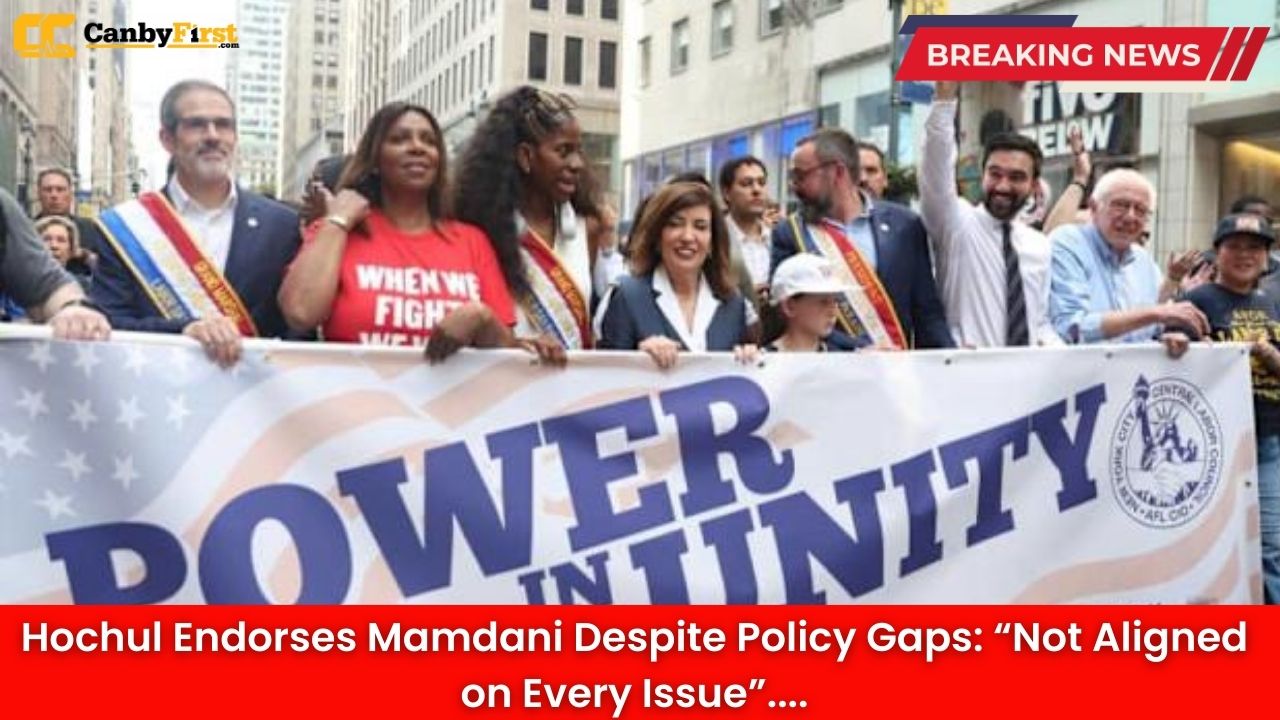New York, US: Governor Kathy Hochul has stepped into the political spotlight with a significant endorsement of State Assemblymember Zohran Mamdani, despite acknowledging clear differences in their policy priorities. The move underscores the pragmatism and complexity of New York’s political landscape ahead of a charged election cycle.
A Strategic Endorsement
Hochul confirmed her support for Mamdani while emphasizing that their alignment is not absolute. “We are not aligned on every issue,” she stated, signaling that while divergences exist, the broader vision for representation and service to constituents outweighs their differences. Her endorsement of Mamdani highlights the balancing act between maintaining unity within the Democratic Party and recognizing the diversity of progressive voices across the state.
Mamdani’s Growing Influence
Zohran Mamdani, a prominent progressive representing Queens, has gained traction for his outspoken advocacy on housing rights, foreign policy issues, and justice reforms. He is seen as part of the wave of Democrats pushing the party toward more left-leaning policy measures. Mamdani’s visibility and vocal stances often put him at the center of debate, both celebrated for his convictions and challenged for his uncompromising positions.
Also Read
Hochul’s decision to endorse him, despite ideological distance, underscores the Assemblymember’s standing as an essential figure within borough politics and the wider progressive movement.
Points of Difference
While both Democrats, Hochul and Mamdani represent different wings of the party. Hochul, a centrist Democrat, has often emphasized governance through moderation, coalition building, and pragmatic policies. Mamdani, meanwhile, identifies strongly with the progressive bloc pushing for transformative changes, including more aggressive housing initiatives, rent protections, and foreign policy stances that have sometimes rattled centrist Democrats.
These differences have not gone unnoticed. Critics argue that the endorsement is less about shared priorities and more about party solidarity in maintaining a Democratic stronghold in New York, particularly as Republicans eye opportunities in outer boroughs.
Political Calculations at Play
Endorsements often go beyond personal policy alignments; they serve as signals of unity, stability, and shared Democratic governance. Hochul’s backing of Mamdani reflects her understanding of the political realities in New York—where dismissing progressive voices could risk alienating an energized voter base.
At the same time, the endorsement shields Hochul from accusations of fracturing the party ahead of a new election season. By standing with Mamdani, she portrays herself as a leader willing to embrace diversity of thought within the Democratic tent while still exercising authority as the state’s chief executive.
Reaction from Supporters and Critics
The announcement has sparked mixed reactions across the political spectrum. Supporters praise Hochul for prioritizing unity over ideological disputes, arguing that the message bolsters Democratic cohesion at a time when nationally, the party faces deep divides. They see her move as an effort to model a “big tent” strategy, ensuring that progressive and centrist Democrats stay aligned against outside challenges.
Critics, however, question whether her endorsement dilutes her policy convictions. Some centrist Democrats expressed concern that embracing figures like Mamdani risks validating platforms they view as outside mainstream voter concerns. Meanwhile, Mamdani’s supporters argue this is a recognition of his grassroots strength and the necessity of progressives in shaping the state’s future.
Looking Forward
As the election season unfolds, Hochul’s endorsement may prove pivotal in solidifying Mamdani’s place not only in Queens politics but also within the broader Democratic movement. For Hochul, the move is an exercise in political calculus—reinforcing her leadership while recognizing the influence of the rising progressive bloc.
What remains clear is that the endorsement marks a delicate balancing act: holding the Democratic coalition together, promoting pragmatic governance, and acknowledging differences without fracturing party trust. The relationship between Hochul and Mamdani may not rest on perfect policy alignment, but it signals recognition that unity could be the most powerful tool heading into the next political chapter.
FAQ
Why did Gov. Hochul endorse Zohran Mamdani if they don’t fully agree on policies?
Hochul emphasized the importance of party unity and representation, stating that alignment on every single issue is not necessary for endorsement.
What are the main differences between Hochul and Mamdani?
Hochul tends to favor centrist, pragmatic approaches, while Mamdani advocates strongly progressive policies, particularly on housing and foreign policy issues.
How have critics reacted to the endorsement?
Some centrists argue Hochul risks legitimizing extreme stances, while progressives say the endorsement is long-overdue recognition of grassroots energy.
What does this mean for New York’s Democratic Party?
The endorsement reinforces the “big tent” nature of New York Democrats, where both centrist and progressive voices are acknowledged to strengthen the party’s unity.












